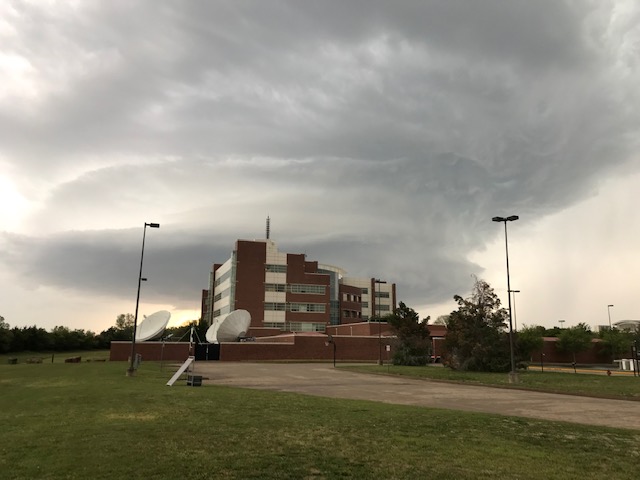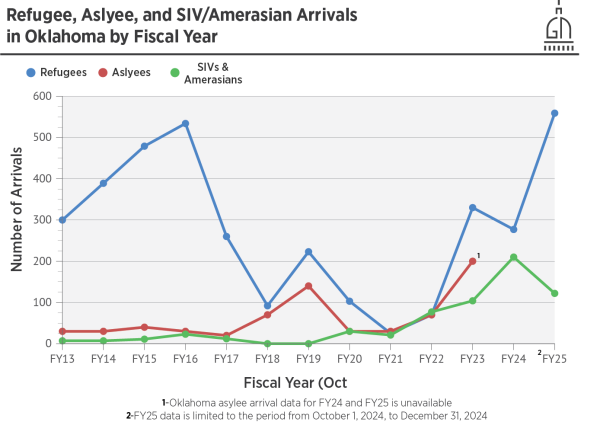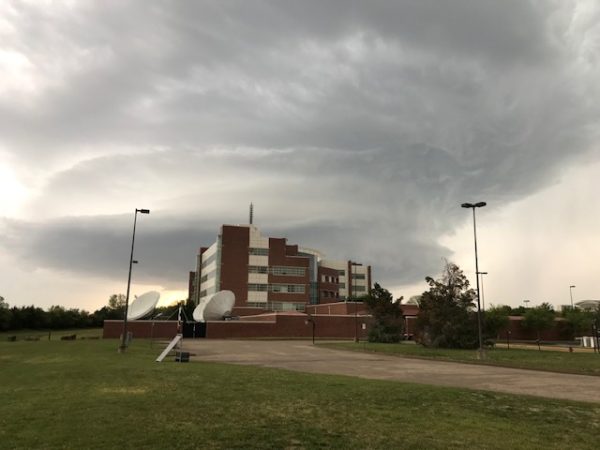Weather response legislation on the way from Oklahoma delegation
The April 19, 2023, tornado is shown bearing down on the National Weather Service Severe Storms building in Norman moments before it shifted further south. (Photo provided by the National Weather Service).
WASHINGTON – With their home state of Oklahoma hit by dozens of tornadoes already in 2023, Rep. Frank Lucas (R-Cheyenne) and Rep. Stephanie Bice (R-Oklahoma City) have been pushing for weather-response related legislation.
Lucas helped pass the Weather Research and Forecasting Innovation Act of 2017, which authorized the National Oceanic and Atmospheric Administration (NOAA) to improve its weather forecasting and alerts. It also allowed NOAA to retrieve data from the private sector.
With multiple programs created by the WEATHER Act set to expire at the end of the 2023 Fiscal Year, Lucas is pushing hard for the Weather Act’s reauthorization.
“At this point in time, we are still taking stakeholder input,” Lucas said in an interview with Gaylord News. “We’re working with our Democrat friends on the other side. We’re jelling around the bullet points on that list right now, but I will say it’s one of my highest priorities.”
Meanwhile, Bice has reintroduced her own bill: The NOAA Weather Radio Modernization Act. This bill would direct NOAA to update outdated technology in its radio systems. When she reintroduced this bill back in March, Bice spoke highly of her legislation.
“Oklahomans are no stranger to severe weather, which is why the NOAA weather radio system is essential to keeping those in every part of our state and across the nation safe,” Rep. Bice said via press release. “My legislation would modernize this lifesaving service and ensure every citizen has reliable and effective access.”
Bice’s legislation passed through the House earlier this month, and Bice hopes that her colleagues in the Senate will approve her bill quickly.
“As the world becomes more digitized, we must ensure that older systems which safeguard life and property don’t get left behind,” Bice said. “I am grateful that the House passed this critical legislation, which seeks to provide every citizen with reliable and effective access to this lifesaving service. I hope my colleagues in the Senate will swiftly adopt this measure.”
Oklahoma has already experienced 48 tornadoes this year, with F3 tornadoes passing just south of Norman through McClain and Pottawatomie on April 19. President Biden declared a major disaster and approved federal aid on April 24.
Updating the radio systems that NOAA uses would hopefully aid response efforts, particularly for areas of the state with poor cell phone service.
Bice and Lucas aren’t the only members of Congress trying to pass weather legislation involving natural disasters. Another member of Congress from a state in Tornado Alley has put forward his own bill involving NOAA and response to natural disasters: Sen. Roger Wicker (R-Miss).
Wicker wrote the Tornado Observation Research Notification and Deployment to Operations (TORNADO) Act and it covers similar ground as Bice’s legislation.
Both bills call on NOAA to update how the organization will respond to disasters, with the TORNADO Act focusing more on data collection and forecasting.
“I introduced the TORNADO Act to help protect against future loss of life and property,” Wicker said via press release. “Improved forecasting is the best way to give residents more time to seek shelter. I appreciate my colleagues for seeing the value in this legislation, and I look forward to earning the support of the rest of the Senate.”
Wicker’s TORNADO Act was cosponsored by members of both parties and passed through the House Commerce, Science and Transportation Committee.
Gaylord News is a reporting project of the University of Oklahoma Gaylord College of Journalism and Mass Communication. For more stories by Gaylord News go to GaylordNews.net.






